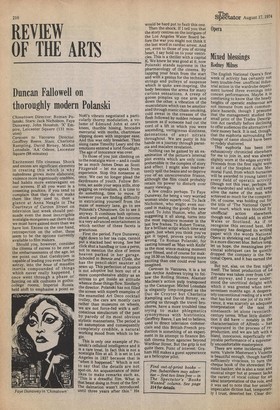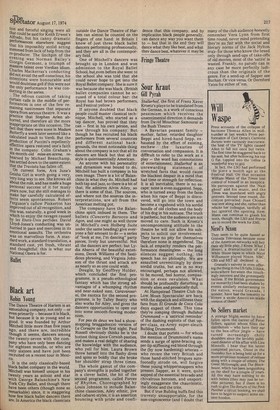Opera
Mixed blessings
Rodney Elms
The English National Opera's first week of activity has certainly not been trouble-free: unofficial indus
trial action in the wardrobe department turned three evenings into
concert performances. Maybe it is comforting to know that the heady heights of operatic endeavour are
not immune from such common
place hazards, though I presume that the management studied the
small print of the Trades Descrip
tion Act carefully before declining to offer audiences the alternative of their money back. It is sad, though, that the euphoria surrounding the change of name should have been so rudely shattered. This euphoria has been too exhaustively chronicled elsewhere for me to join in, and was always slightly worn at the edges anyway. Proceeds from the first night were in aid of the Stephen Arlen Me' morial Fund, from which bursaries will be awarded to young talent in every field of operatic activity (though not this year, perhaps, in the wardrobe) and which will keep alive the name of the man who
achieved so much for the company. He, of course, was holding out for, the title of 'The National Opera tout court, which was blocked by unofficial action elsewhere, though not, I should add, in either Wales or Scotland. As if t° recognise this second best, the company has designed its writing paper with the words National Opera in shrieking red and English in a more discreet blue. Before long, let us hope, the meaningless provincial sobriquet can be quietly dropped: the company is the National Opera, and it has earned the title.
But not, alas, on the first night itself. The latest production of La Traviata was taken over from Cardiff anyway, and I never understood the uncritical delight with which it was greeted when new, seventeen months ago. A desperately conventional reading of a work that has lost not one jot of its relevance, it was scarcely an adequate interpretation of the text in nineteenthlet alone twentiethcentury terms. What little distinction it did have — notably in the characterisation of Alfredo — has evaporated in the process of reproduction, and we are left with a bland, innocuous, superficially enjoyable performance of a supremely uncomfortable masterpiece.
There are some incidentai pleasures. Valerie Masterson's Violetta is beautiful enough, though hardly sufficiently vivacious, to turn the cheque book of the shrewdest Parisian banker; she is also a neat and musical singer but at present lacks the variety of vocal colour for an ideal interpretation of the role, and it was sad to note that her usually impeccable diction had, temporarily I trust, deserted her. Clear dic opectator August 17, 1974 tion and forceful singing were all that could be said for Keith Erwen's Alfredo, but his canny dramatic performances elsewhere suggest that his impossibly stolid acting stemmed from lack of help from the re-producer. The linchpin of the evening was Norman Bailey's Giorgio Germont, a triumph of massive talent over Verdian idiom. Gharles Mackerras's conducting did not avoid the self-conscious; his intentions were honourable and would doubtless gell if this were not the only performance he was conducting in the series.
The odious custom of taking curtain calls in the middle of per formances is one of the few remaining nastinesses that separate opera from serious theatre. It was a Practice that Stephen Arlen abhorred, and therefore all the more inappropriate on this occasion. The fact that there were none in Madam Butterfly a week later seemed like a calculated insult to Verdi. But the Production of Puccini's repellently effective opera restored one's faith
ifl. the company. Colin Graham's six-month-old mise-en-scene, rehearsed by Michael Beauchamp, has settled down to the same extent that the Traviata has fallen off.
On current form, Ava June's Geisha Girl is worth going a very, Very long way to see. She knows all about the role, and has made a huge Personal success of it for many years now, but she still manages to make her carefully calculated effects seem spontaneous. Robert Ferguson's callow Pinkerton has improved out of all recognition, and this was, naturally, a good week in Which to enjoy the ravages caused by les Etats-Llnis perfides. David Lloyd-Jones's conducting was un hurried in pace and merciless in its emotional assaults. The orchestra was on marvellous form. A stan dard work, a standard translation, a standard cast, yet fresh, vibrant and thoughtful: this is what our National Opera is for.



































 Previous page
Previous page